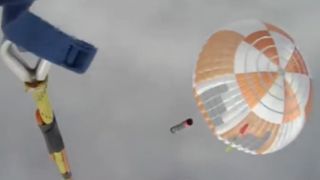Rocket Lab plans another helicopter catch later this year
The company says data so far from May's epic helicopter snatch shows a lot of success.

Keep your eyes out for another rocket-grabbing helicopter snatch.
Rocket Lab officials plan to snag another falling Electron booster out of the air by the end of 2022, they announced Thursday (Aug. 11) during a quarterly results call.
CEO Peter Beck told analysts that the data from the epic helicopter catch in May indicates that everything mostly went to plan. This is despite the fact that the helicopter pilots released Rocket Lab's booster into the water due to concerns about how their rotorcraft was flying.
"I mean, we've been pretty happy with the condition ... even though we dunked it into the water," Beck said of the Electron first stage during the phone call with analysts. "All of the areas that that typically see the most amount of load, and the areas that we've been iterating on, look pretty successful."
Related: Rocket Lab and its Electron booster (photos)
While Electron is marked as an expendable booster so far, Rocket Lab has a path to reusability. Their plan calls for the company to snag more first stages using a helicopter and then bring them back to land for inspection, refurbishment and flying again.
Rocket Lab's reusability focus to save on costs is similar to one of its competitors, SpaceX, although the two differ in launch scale. Electron is a dedicated rideshare for smaller satellites, while SpaceX's Falcon 9 tends to bring much larger satellites to orbit.
Get the Space.com Newsletter
Breaking space news, the latest updates on rocket launches, skywatching events and more!
Related: Falcon 9: SpaceX's workhorse rocket
Beck acknowledged that Rocket Lab does not have many customers in the manifest right now, as the company has a small backlog of missions. Government missions such as a recent launch for the National Reconnaissance Office are continuing to provide stability, he emphasized.
Rocket Lab's customers are cautious about spending, he added, as many of them went public in recent months. Amid overall market declines, he added, "it's not the greatest conditions compared to where we were a year ago, but much better than being in the private markets."
Rocket Lab is also building a next-generation reusable Neutron launcher in Wallops Island, Virginia, at a site next door to the company's coastal U.S. launch pad. The reusable Neutron, targeted for larger payloads than Electron, is optimized for satellite megaconstellations, fuel-heavy interplanetary missions and perhaps human missions in the far future, company officials have said.
"We won't go into too much detail on Neutron today," Beck said in the Thursday call, adding a more "fulsome update" will be forthcoming Sept. 21.
As the company develops Neutron, Electron is starting to reach into interplanetary realms for the first time. Electron recently sent NASA's CAPSTONE cubesat on a moonbound trip, and Rocket Lab plans to launch a private mission to Venus next year on another Electron.
Rocket Lab doubled its loss in the quarter compared with the same time last year, posting $37.4 million in Q2 2022 compared with $16.7 million for the same period last year. Its revenues underwent quite the boost, however. Quarterly revenues totaled $55.5 million for the quarter, which is five times the amount Rocket Lab saw in 2021.
The company's third-quarter revenue forecast is much like the just-finished quarter, ranging between $60 million and $63 million.
Follow Elizabeth Howell on Twitter @howellspace. Follow us on Twitter @Spacedotcom or on Facebook.
Join our Space Forums to keep talking space on the latest missions, night sky and more! And if you have a news tip, correction or comment, let us know at: community@space.com.

Elizabeth Howell (she/her), Ph.D., is a staff writer in the spaceflight channel since 2022 covering diversity, education and gaming as well. She was contributing writer for Space.com for 10 years before joining full-time. Elizabeth's reporting includes multiple exclusives with the White House and Office of the Vice-President of the United States, an exclusive conversation with aspiring space tourist (and NSYNC bassist) Lance Bass, speaking several times with the International Space Station, witnessing five human spaceflight launches on two continents, flying parabolic, working inside a spacesuit, and participating in a simulated Mars mission. Her latest book, "Why Am I Taller?", is co-written with astronaut Dave Williams. Elizabeth holds a Ph.D. and M.Sc. in Space Studies from the University of North Dakota, a Bachelor of Journalism from Canada's Carleton University and a Bachelor of History from Canada's Athabasca University. Elizabeth is also a post-secondary instructor in communications and science at several institutions since 2015; her experience includes developing and teaching an astronomy course at Canada's Algonquin College (with Indigenous content as well) to more than 1,000 students since 2020. Elizabeth first got interested in space after watching the movie Apollo 13 in 1996, and still wants to be an astronaut someday. Mastodon: https://qoto.org/@howellspace
